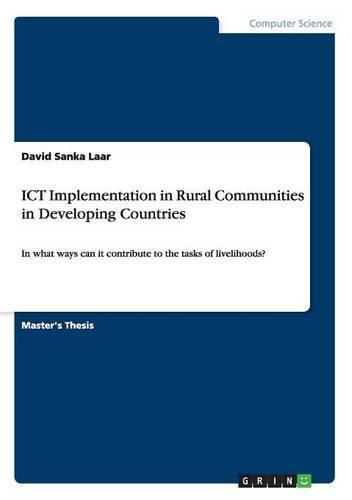Readings Newsletter
Become a Readings Member to make your shopping experience even easier.
Sign in or sign up for free!
You’re not far away from qualifying for FREE standard shipping within Australia
You’ve qualified for FREE standard shipping within Australia
The cart is loading…






Master’s Thesis from the year 2005 in the subject Information Management, University of Manchester (IDPM), course: MSc Management and Information Systems, language: English, abstract: There has been a gamut of arguments concerning the role of information and communication technologies in reducing poverty and creating sustainable rural development in developing countries. But most of the studies have centred on case study descriptions, with a handful attempting to analyse the outcomes of these initiatives using a framework that addresses the multiple dimensions of the livelihoods of the rural poor. This dissertation takes a view that ICT can contribute to sustainable rural development when it is implemented and assessed through such a framework geared at building the capabilities and assets of the rural folks and improving the links within and between these people and the organisations and institutions that play a role in rural development. It reviews various paradigms of rural ICT in developing countries and goes on to analyse the implementation and contribution of two of such initiatives to rural livelihoods using the Sustainable Livelihoods Framework. The result revealed that such factors, as the perceptions of practitioners, political contentions and policy environments are the major factors shaping ICT initiatives for the rural poor.
$9.00 standard shipping within Australia
FREE standard shipping within Australia for orders over $100.00
Express & International shipping calculated at checkout
Master’s Thesis from the year 2005 in the subject Information Management, University of Manchester (IDPM), course: MSc Management and Information Systems, language: English, abstract: There has been a gamut of arguments concerning the role of information and communication technologies in reducing poverty and creating sustainable rural development in developing countries. But most of the studies have centred on case study descriptions, with a handful attempting to analyse the outcomes of these initiatives using a framework that addresses the multiple dimensions of the livelihoods of the rural poor. This dissertation takes a view that ICT can contribute to sustainable rural development when it is implemented and assessed through such a framework geared at building the capabilities and assets of the rural folks and improving the links within and between these people and the organisations and institutions that play a role in rural development. It reviews various paradigms of rural ICT in developing countries and goes on to analyse the implementation and contribution of two of such initiatives to rural livelihoods using the Sustainable Livelihoods Framework. The result revealed that such factors, as the perceptions of practitioners, political contentions and policy environments are the major factors shaping ICT initiatives for the rural poor.